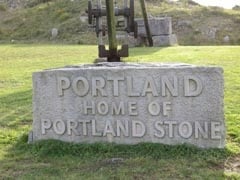Three days before Christmas the 38 people employed at Easton Masonry (UK) Ltd on Portland, Dorset, lost their jobs as liquidators were called in. At the same time, Hanson concluded the sale of their Portland quarries and masonry works to Cladding Consultants Ltd, the parent company of Easton Masonry.
Hanson Bath & Portland’s 34 sales and production staff on the island transferred to Stone Firms Ltd, headed by Geoff Smith. Stone Firms Ltd is a wholly-owned subsidiary of Cladding Consultants.
Geoff Smith headed Easton Masonry (Portland) Ltd, the company that used French limestone rather than Portland stone from Dorset to build the new south portico in the Great Court of the British Museum in 1999.
Easton always maintained that the Anstrude Roche Claire used for the south portico fulfilled the specification for ‘Portland or similar’.
The British Museum’s south portico was built by Easton Masonry (Portland). Easton Masonry (UK) Ltd, on the same premises, had Stephen Mold as managing director.
Stephen Mold was among those who lost his job just before Christmas. He said afterwards he was not sure what he would do now.
Geoff Smith, commenting publicly for the first time about the Great Court controversy, told NSS: "Despite great press controversy that had been dredged up, the company, which had a great quality reputation, complied fully with its specification, pursued a claim and recovered unpaid contract sums and variation costs in December 2003."
When Hanson put Bath & Portland on the market (see NSS June 2004) they wanted to include in the sale their masonry works at Keynsham, Bristol, bought from the receivers of Drings of Bath in 1997, their Bath stone mines and the quarries of Guiting, in the Cotswolds, and Flick, in Oxfordshire. However, they were unable to find a buyer for the whole package and for now sales of the remaining operations are being handled from Keynsham by Garry Sellick (Tel: 0117 986 9631).
Hanson put Bath & Portland on the market because the massive international group said the dimensional stone operation was a non-core part of their business. The remaining quarries and works clearly remain outside their core interests of aggregates, asphalt and concrete.
Stone Firms say they continue to produce Portland limestone block from the three active former Bath & Portland quarries (Combefield, Broadcroft and Perryfield) and still have reserves in Fancy Beach, although it has not been worked for a few years. There are other permissions and redundant quarries involved in the deal. Announcing the sale, Hanson said the Portland quarries produce around 7,000m3 of high quality limestone a year.
The stone is available as block and worked masonry from Stone Firms at the former Bath & Portland address in Bumpers Lane, Portland. Tel: 01305 820207.
Neil Fuller, works manager both before and after the sale, says the protracted sale of the business (it had been expected to have concluded in July) had been disruptive and priority now is to get the message out to customers that Portland limestone is available from Stone Firms. And to encourage sales the price has been reduced to £500/m2.
Neil says: "Really we're looking at getting Portland affordable again. We're doing what we think we need to do to get our stone accepted in the market place."
Easton Masonry (UK) Ltd’s shareholders will meet on 18 January, followed by a meeting of creditors. HJS Recovery, who were called in as liquidators on 22 December, say they are not aware of any assets owned by the firm apart from work in progress, the value of which was being assessed for them by a quantity surveyor.
Easton Masonry’s current projects in December included the hand setting of Portland stone on the BBC’s redevelopment of Broadcasting House in Portland Square, London.

